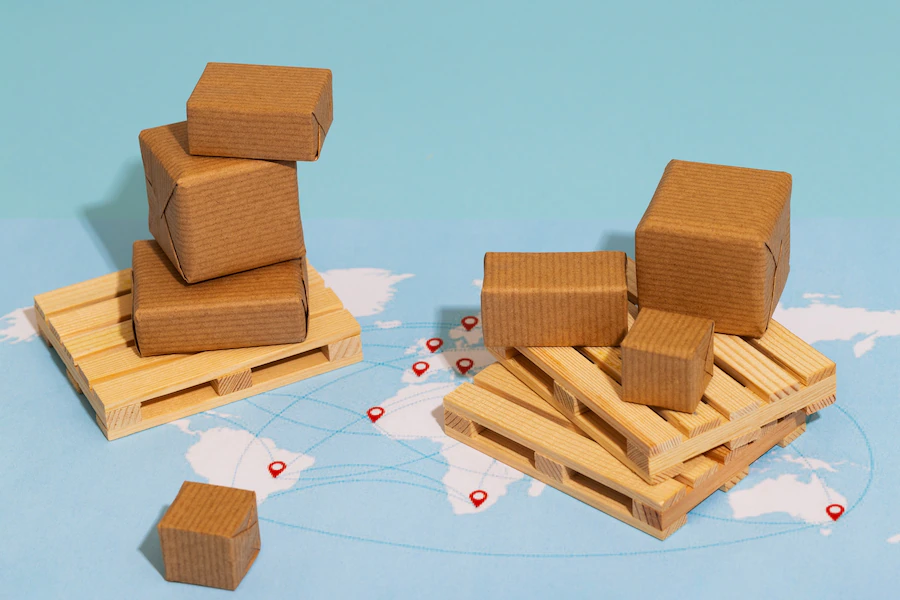The Impact Of International Trade Agreements On UK To Baltic Pallet Shipping
5 Mins Read
Published on: 21 September 2023
Last Updated on: 11 November 2024

toc impalement
In an ever-evolving global market, British businesses are constantly seeking avenues to expand their reach, cementing their footprint across borders. The Baltic countries – Lithuania, Latvia, and Estonia – present remarkable opportunities for UK establishments, thanks to favorable international trade agreements.
While the prospect of shipping pallets might seem straightforward, it demands expertise to navigate the intricacies of cross-border transactions. The confluence of geopolitical, legal, and logistical challenges can be daunting.
Consequently, businesses eyeing the Baltic market should be equipped with insights into how these agreements directly impact pallet shipping, ensuring seamless and efficient freight forwarding.
Why Establishing Trade Relationships Is Important?
Trading landscapes or trading relations between two or more nations is important for reasons more than one. The world is a global village, and a country requires the support of another country to foster economic growth. This is because no country on earth is fully self-reliant. Deepening international trade relationships is important from multiple points.
Self Sufficiency
When two nations engage in a trading relationship, they try their level best to identify their own requirements. Thus, when they engage in this give-and-take relationship, both of them benefit from the exchange of goods and services. Trading ties also help in deepening politics between two nations.
In the geo-political framework, every country has its own interests and different permutations and combinations. But with trade agreements, self-dependency can be achieved.
Gaining Competitive Advantage
This is the age of establishing trade relationships. The world is a common market now. You have to try your level best to identify your own problems. Based on one’s own weakness, they different nations establish business relations complying with the trade agreements.
Intermingling two nations and co-benefitting in different projects can help both nations gain a competitive advantage. It is the viewpoint of Adam Smith. For example, Italy has a good breed of cattle, and with their help, they can produce the best of cheese.
Again, Japan has a population with high expertise in electronic goods. This is how they can make the best quality electronic products. Now, both countries can seek it as an advantage and stay ahead in the competitive markets.
Deepening Cultural Ties
The exchange of ideas, people, products, and services enables both nations to understand each other’s temperaments. Deepening the cultural ties enables two nations to find more opportunities for further trade and exchange. This very approach is highly helpful in strengthening deeper ties between both countries. Ultimately, trading relations benefit people with economic backgrounds.
The Role Of International Trade Agreements In Facilitating UK-Baltic Trade

The geopolitical landscape of international trade has seen significant recalibrations in recent years, with countries continually striving to optimize trade relations. Between the UK and the Baltic nations, international trade agreements serve as a linchpin, ensuring streamlined transactions and fostering mutual economic growth.
These accords primarily focus on eliminating barriers like tariffs, quotas, and other trade restrictions, making the process of shipping pallets considerably more cost-effective for British businesses.
Additionally, they provide frameworks for dispute resolution, ensuring that businesses have a structured pathway to address any discrepancies or challenges. Furthermore, these agreements cultivate a proactive environment that encourages bilateral trade, ultimately benefiting both the UK and Baltic economies.
Such symbiotic relations enhance trading prospects and foster stronger diplomatic ties. With reduced bureaucratic red tape and harmonized regulations, businesses can expect a smoother shipping experience, amplifying their potential to tap into the promising Baltic market.
Navigating The Complexities Of Road Freight To The Baltics
While air and sea freight have their merits, road freight stands out when shipping to the Baltics, primarily due to its efficiency and directness. However, this mode of transport presents its own labyrinth of complexities.
From ensuring compliance with varying road regulations across countries to understanding the specific documentation required at different border crossings, the road to the Baltics is paved with intricate challenges. As this route often traverses multiple countries, understanding the cultural and legal differences becomes paramount.
Diverse climates and terrains necessitate appropriate packing and shipping strategies, ensuring that goods remain intact irrespective of external conditions. Additionally, the fluid geopolitical scenarios in the European continent can sometimes impact transit times and require contingency planning.
The nature of the cargo, especially when dealing with groupage, full loads, part loads, and express freight, further adds to the complexity. Employing a seasoned freight forwarder, one that’s not just familiar but adept with these nuances, can be the deciding factor between a shipment reaching its destination promptly or getting ensnared in a logistical quagmire.
The Indispensable Role Of Expertise In UK-Baltic Pallet Shipping
When venturing into the Baltic market, the importance of a proficient freight forwarder cannot be overstated. Entrusting your cargo to professionals who possess a rich tapestry of experience ensures that each pallet is treated with the utmost care and precision. In-depth knowledge of local customs procedures, warehousing options, and efficient route planning significantly enhances the shipping process by streamlining Customs Declaration and related workflows. Barrington Freight, as a specialist in shipping commercial B2B freight, has honed its skill set over the years, adapting to the ever-changing landscape of international logistics.
Their commitment to quality, mirrored by their esteemed memberships with BIFA and FIATA, attests to their industry prowess. Being abreast with the latest technological advancements in freight forwarding and their adherence to sustainable shipping practices further solidifies their position.
Entities like Barrington Freight provide businesses with the peace of mind that their shipments will be handled with expertise. In an industry rife with challenges, expertise isn’t just beneficial; it’s quintessential.
Conclusion
The realm of UK-Baltic pallet shipping is a dynamic one, intricately woven with the threads of international trade agreements, logistical challenges, and the critical need for expertise. As the global market continues its perpetual evolution, British businesses must arm themselves with not just knowledge but also the right partners. Choosing professionals in the field, ones with a demonstrated track record, can be the difference between successful market penetration and logistical gridlock. In this journey, expertise is the compass that points towards success.
Read Also:


















Comments Are Closed For This Article